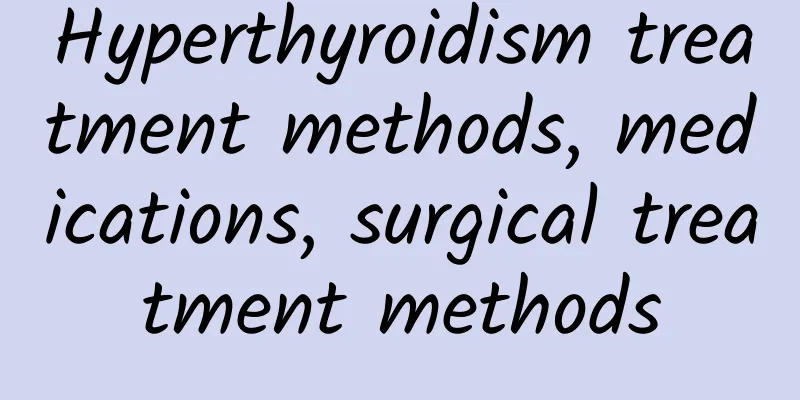Hyperthyroidism treatment methods, medications, surgical treatment methods

|
Hyperthyroidism, also known as hyperthyroidism, is a disease caused by a variety of reasons, which leads to an increase in thyroid hormone in the blood. Common symptoms include palpitations, heat intolerance, sweating, increased appetite, weight loss, thick neck, and exophthalmos. The current treatments for hyperthyroidism are mainly drug therapy and surgical treatment. 1. Treatment of hyperthyroidism1: Drug treatment: Prednisone 10-40 mg, 3 times a day, has a certain effect on early cases. After the symptoms improve, the dosage can be gradually reduced and switched to a maintenance dose of 5-20 mg per day. The minimum dose can also be given every other day and finally discontinued. Other immunosuppressants, such as cyclosporine A, cyclophosphamide, chlorambucil (Cyclophosphamide, CB1348), 6-MP, etc. can be tried. Thyroid powder (tablets) If hypothyroidism, thyroid enlargement or more obvious exophthalmos occurs during the treatment, thyroid powder (tablets) 20-40 mg/d should be added, and the dosage of methylprednisolone (methimazole) should be reduced as appropriate. 2: Surgical treatment: Patients with drug allergy, granulocytopenia, thyroid tumor, obvious thyroid enlargement and no obvious shrinkage after taking medicine, relapse after taking medicine, etc. are indicated for thyroid surgery. Antithyroid drugs should be used for 2 to 3 months before surgery to normalize thyroid function. Take iodine/potassium iodide (compound iodine solution) for 1 to 2 weeks before surgery to prevent intraoperative bleeding. From 4 days before surgery to 7 days after surgery, take propranolol 1 to 2 mg/kg orally, once every 6 hours. The incidence of hypothyroidism after surgery is 50%, and a small number of cases have temporary or permanent hypoparathyroidism. Postoperative complications include temporary or permanent hypoparathyroidism. Temporary hypothyroidism may occur within 2 months after surgery, while permanent hypothyroidism usually occurs half a year after surgery. 2. Patients should avoid eating1: 1. Avoid spicy food: chili pepper, raw onion, raw garlic; 2. Avoid seafood: kelp, shrimp, hairtail; 3. Avoid strong tea, coffee, tobacco and alcohol; 4. Avoid iodine food and medicine; 5. Eat less greasy food. 3. Prevention of hyperthyroidism1: In daily life, we should first maintain a cheerful spirit and a good mood. Secondly, a proper diet and avoid irritating foods are also important preventive measures. At the same time, it is also important to have a regular daily routine, avoid overwork, support the spleen and stomach, strengthen the body, and improve one's immunity and disease resistance. 2: Prevent the disease from spreading If hyperthyroidism has already occurred, it should be diagnosed and treated early to prevent the disease from spreading, that is, to prevent the disease from getting worse and the occurrence of complications. We should take preventive measures according to the laws of complication occurrence to prevent the occurrence of complications and control the transformation of the disease. 3: Prevent recurrence after recovery Since the disease is very complicated, treatment requires a long process and good care. Therefore, in the initial recovery stage, comprehensive adjustment of medication, diet, spiritual medicine, etc., regular inspections and careful monitoring are important measures to prevent recurrence after illness. IV: In general, the treatment of hyperthyroidismIn general, patients should take conservative medications as much as possible, and consider surgery in severe cases to reduce the harm to themselves. In addition, the editor recommends that patients avoid excessive physical fatigue to prevent aggravation of related symptoms. |
<<: What is hypoglycemia? Be alert to hypoglycemia
Recommend
How to maintain your prostate? Here are four methods
In daily life, men who know how to maintain their...
Causes of itching in men's genitals
There are many things in life that are hard to ta...
Why is the glans penis a little yellow?
The glans penis is a very important organ for men...
What is the situation of testicle shrinkage?
Testicles are a very important number for men. Th...
What are veins? Detailed explanation of the classification of human veins
Blood vessels are channels for blood circulation....
Slightly enlarged and calcified prostate
Prostate disease is a common disease among men. T...
How long after circumcision surgery can I take a shower?
Long foreskin can cause many problems for men, wh...
Treatment of male sexual function affected by low testosterone secretion
According to the developmental characteristics of...
How to care after phimosis surgery
When the foreskin is expanded, if it is exposed n...
What is the function of leg hair and what is the function of other body hair?
While many people are worried about the excessive...
What is the best and healthiest way to remove wrinkles?
Many young people will develop fine wrinkles arou...
Is bone hyperplasia a type of bone hyperplasia? What are the symptoms of bone hyperplasia?
I believe everyone has experienced bone fractures...
How to reduce the sensitivity of the glans penis
The oversensitivity of the glans penis is the roo...
How to cure impotence?
Impotence and premature ejaculation are common di...
How to treat male frostbite
Winter is here. While enjoying the beautiful snow...









